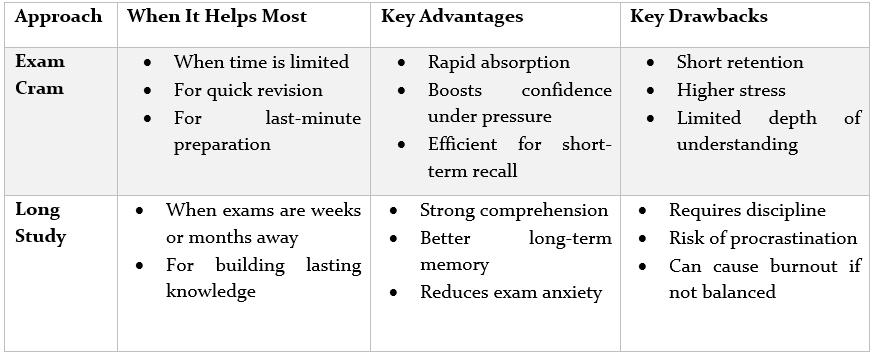
Exam Cram vs. Long Study: Which Works Better?

Introduction
When studying for exams, learners frequently have to choose between intensive last-minute review and continuous long-term study. Although each strategy has its own set of advantages, the approach you choose can have a major impact on both performance and retention. Understanding how different tactics compare is critical for evaluating which path leads to better academic performance.
At VERSAtile Reads, we offer expertly crafted Exam Cram Notes that make preparation efficient and effective. Our cram notes provide clear explanations, focused highlights, and practical strategies to help you review the most important concepts quickly. Explore VERSAtile Read’s Exam Cram Notes today and walk into your exams with confidence.
Enduring Benefits of Long Study
Extended study, built on steady and active engagement, provides benefits that outweigh the quick gains of cramming. By emphasizing progressive mastery, this strategy promotes genuine comprehension and the ability to apply knowledge in real-world situations. Over time, it not only improves recall but also cultivates transferable abilities, allowing students to tackle increasingly complex material with confidence and resilience.
Path to Deeper Understanding
True comprehension comes when learners spend enough time connecting with material in a meaningful way. Long-term study allows them to go beyond surface memorization and establish structured knowledge that lasts. Strategies like describing things in simple words or building visual mind maps help to strengthen connections and transform isolated data into unified understanding. This strategy ensures that the knowledge is assimilated and ready to be employed in various scenarios.
Securing Knowledge for the Future
Sustained learning has been shown to have an important role in preserving knowledge and making it accessible for future use. Cognitive research shows that reviewing content over time improves long-term recall by strengthening brain connections. Each return to the topic renews understanding and keeps notions from fading. As a result, students can rely on their knowledge not only for upcoming tests, but also for professional and academic development.
Minimizing Stress in Learning
The loop of racing through cramming sessions and worrying over forgetting facts often worsens academic stress. Long-term study offers an alternative by establishing a consistent rhythm of preparation, which relieves stress and decreases last-minute anxiety. Students acquire confidence in their readiness when they review content on a consistent basis. This regularity promotes a calmer perspective, helping students to approach exams with attention, clarity, and improved emotional control.
Building on Prior Knowledge
Learning is cumulative, with each new concept building on previous knowledge to take root. A steady study schedule facilitates this natural growth by helping students to incorporate new information into their existing knowledge. Over time, this layering process creates a stable intellectual framework. With a solid foundation, learners are better able to comprehend complex topics and solve increasingly difficult issues.
Challenges of Long Study
Threat of Postponement and Neglect
Persistence and self-discipline over a long period of time are required for sustained learning. However, the extended timeframe frequently creates complacency, giving students the impression of having plenty of time. This impression may encourage procrastination, leaving important topics ignored until deadlines arrive. As a result, students may struggle to manage their workload properly and achieve poorer results on exams.
Possibility of Overexertion and Distress
Sustained study for lengthy periods of time often puts a strain on students’ mental and emotional health, increasing the risk of burnout. Maintaining a rigid routine for several weeks or months might feel demanding, especially when combined with academic or personal obligations. Such weariness not only lowers academic performance, but it also increases stress and reduces motivation.
Risk of Excessive Cognitive Strain
Prolonged study times can put a burden on cognitive capabilities, resulting in mental tiredness and reduced ability to remember information. When students try to process big amounts of material without enough rest, their brain’s efficiency suffers, typically resulting in increased exam stress and poor overall performance.
Maximizing Results with Cramming
Many students unavoidably find themselves preparing at the last minute, with few options other than to focus intensively on the content. In such instances, cramming, when addressed with attention and structure, can be an incredibly successful technique of preparation. It promotes rapid absorption of core material and short-term memory, making it especially useful when tests require immediate recall and time restrictions prevent lengthy study tactics.
Quick Rehearsal and Retrieval
When faced with a large amount of stuff and little time, cramming can be a useful method for reducing information into manageable bits. Students can undertake a quick yet meaningful study of high-yield material by prioritizing key elements. This method improves short-term memory, ensuring that important information remains accessible during the exam. Though not meant for long-term mastering, it provides a timely advantage in rapidly approaching tests.
Mental Uplift
A last cram session can be very useful for regaining confidence and bridging knowledge gaps that would otherwise cause worry. For students who have already covered the content in previous sessions, this last-minute review serves as a mental refresher, reactivating essential information that may have faded from memory. Beyond the academic value, this approach provides a sense of confidence, helping learners feel more prepared and mentally composed before entering the exam room.
Efficiency Under Pressure
For people who thrive in high-pressure situations, cramming can boost productivity. The urgency of the situation frequently produces adrenaline, which sharpens concentration and momentarily increases awareness, allowing information to be processed and consolidated more quickly. While not a long-term learning paradigm, its efficiency under pressure can be useful in urgent situations, converting stress into motivation and maximizing performance in time-sensitive academic contexts.
Drawbacks of Relying on Cramming
Brief Retention
Cramming frequently results in short-term success, but its effects fade quickly after the exam is over. According to studies, material learned in this manner is rarely transmitted to long-term memory, making retention challenging beyond the current test. As a result, while students may do well in the present, their capacity to retain the same information later is dramatically lowered.
Elevated Strain and Worry
The pressure of cramming enormous amounts of study material into a restricted amount of time frequently causes stress. The pressure to perform well under such circumstances can soon become draining, resulting in increased anxiety and burnout. Over time, this tendency strains both mental and emotional health, resulting in decreased focus, confidence, and overall academic success.
Limited Grasp
Cramming alone yields only a superficial understanding of the subject. Rather than creating genuine involvement, students frequently commit details to memory without understanding the principles underlying them. This reduces analytical skills and limits information transfer to practical circumstances, eventually leaving learners unprepared to face complicated or future academic expectations.
Exam Cram vs. Long Study: When to Use Each

Exam Prep Solutions
VERSAtile Reads offers exam-focused resources created exclusively for IT certifications. Exam Cram Notes are available for rapid, targeted revision, practice questions to test knowledge under real-world exam situations, brief guide books that clarify complicated concepts, and glossary booklets for quick review of essential terms. Together, these tools assist learners in preparing effectively, strengthening understanding, and approaching certification tests with confidence.
Conclusion
Students looking to balance the benefits of cramming with long-term study can benefit from a variety of practical tactics that improve efficiency and memory. Begin by creating a systematic study plan that includes both brief, targeted review sessions and extended learning times. Use tried-and-true tactics like spaced repetition and active recall to reinforce knowledge over time, while simultaneously prioritizing self-care and stress management to maintain optimal cognitive performance. Using different study methods can increase engagement and effectiveness, and setting attainable goals helps to maintain motivation and success. Maintaining structure, such as deliberately arranging study materials and maintaining a distraction-free environment, promotes consistent and successful learning. Finally, consistently celebrating victories, no matter how modest, and changing goals as needed will help to foster excellent study habits and assure continuous growth.
FAQs
1. Can cramming ever be an effective study method?
Yes, when used strategically, cramming can help with rapid absorption of key information and short-term memory retention. It is particularly useful for last-minute review, high-pressure situations, or exams that require immediate recall.
2. How can students balance long-term study with exam cramming?
Students can balance the two by creating structured study schedules that include both extended learning periods and short, targeted review sessions. Techniques like spaced repetition, active recall, and varying study methods improve retention while managing stress and engagement.
3. What strategies help prevent burnout during extended study sessions?
To avoid burnout, students should maintain a consistent routine, take regular breaks, manage stress effectively, and organize study materials in a distraction-free environment. Setting realistic goals, celebrating small achievements, and adjusting plans as needed also help sustain motivation and cognitive performance.
- Published Date:



